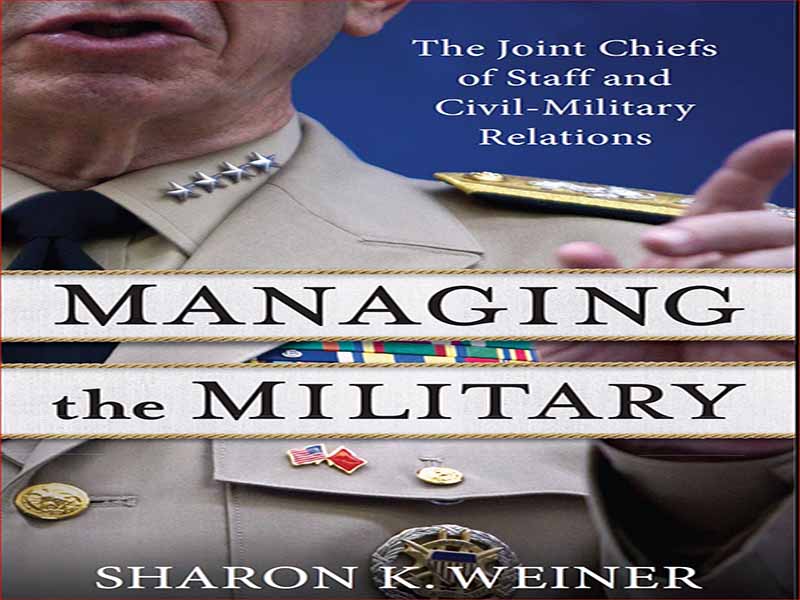- عنوان کتاب: Managing the Military
- نویسنده: SHARON K. WEINER
- حوزه: مدیریت نظامی
- سال انتشار: 2022
- تعداد صفحه: 256
- زبان اصلی: انگلیسی
- نوع فایل: pdf
- حجم فایل: 2.84 مگابایت
رئیس ستاد مشترک ارتش آمریکا (JCS) مسلماً قدرتمندترین افسر نظامی ایالات متحده از نظر سیاسی است. بخشی از نفوذ او به دلیل اقتدار رسمی است. علاوه بر این که بالاترین رتبه نیروهای مسلح است، قوانین متعددی به او نفوذ بیشتری بر رهبران نظامی فردی که ارتش، نیروی دریایی، نیروی هوایی و تفنگداران دریایی را بر عهده دارند، که در مجموع به عنوان JCS شناخته می شوند، داده است. او همچنین رسماً به عنوان مشاور نظامی اولیه رئیس جمهور و همچنین وزیر دفاع و شورای امنیت ملی تعیین شده است. در این نقشها، توصیهها و توصیههای او بر تصمیمگیری در مورد استراتژی، عملیات و هزینههای نظامی تأثیر بسزایی دارد. اما بخشی از قدرت رئیس از پیامدهای گستردهتر این انتخابهای سیاسی ناشی میشود. برای مثال، حمایت قاطع رئیس مایک مولن از افزایش نیروها در سال 2009 نه تنها به متقاعد کردن رئیس جمهور باراک اوباما کمک کرد، بلکه به حفظ ائتلاف نیروهای متحد و همچنین استراتژی ملت سازی در افغانستان کمک کرد که در نهایت شکست خورد. محدودیتهای هزینهای که توسط قانون کنترل بودجه سال 2011 مقرر شده بود، به لطف استدلالهای مکرر افسران ارشد نظامی، مانند رئیس جوزف دانفورد، که رشد واقعی بیش از تورم برای امنیت ملی لازم است، بارها افزایش یافته است. در سال 2007، زمانی که پیتر پیس، رئیس، همجنسگرایی را غیراخلاقی خواند، محکومیت سریع کنگره و همچنین گروههای مختلف جامعه مدنی را به همراه داشت، زیرا نگرانیهایی که اظهارات وی باعث تبعیض در ارتش و همچنین بهطور گستردهتر شود. علاوه بر اختیارات رسمی و پیامدهای گسترده انتخاب ها در مورد سیاست دفاعی، قدرت سیاسی رئیس نیز نشأت گرفته از انتخاب هایی است که او در مورد چگونگی ایفای نقش خود به عنوان برجسته ترین افسر نظامی در ایالات متحده انجام می دهد. مارک میلی، که یک دوره چهار ساله را در اکتبر 2019 آغاز کرد، نمونه های متعددی از نفوذ رئیس، هم عمدی و هم سهوی ارائه می دهد. در طول انتخابات ریاست جمهوری 2021، میلی نگران شد که رفتار تهاجمی رئیس جمهور دونالد ترامپ، که همزمان با تمرینات نظامی ایالات متحده در دریای چین جنوبی بود، توسط چین به عنوان پیشروی برای اقدام نظامی تفسیر شود. میلی بدون اطلاع رهبران غیرنظامی یا دریافت راهنمایی از آنها، با همتای خود در چین تماس گرفت تا اطمینان دهد که دولت ایالات متحده باثبات است و مستعد تجاوز بی پروا نیست. کمتر از یک ماه بعد، زمانی که میلی به نانسی پلوسی، رئیس مجلس نمایندگان پیشنهاد کرد که ارتش هر تصمیم پرزیدنت ترامپ برای پرتاب تسلیحات هستهای را نادیده بگیرد، دوباره جنجال برانگیخت. سال قبل، در ژوئن 2020، میلی شاید ناخواسته در یک عکسبرداری با پرزیدنت ترامپ و اعضای کابینه شرکت کرد که بسیاری آن را به عنوان یک شیرین کاری کمپین با مضامین خودکامه و نژادپرستانه تفسیر کردند. مایلی لازم دید که عذرخواهی عمومی برای “ایجاد تصوری از ارتش درگیر در سیاست داخلی” ارائه کند. اقدامات میلی مطمئناً به اختلافات حزبی موجود دامن زد. او عمدتاً از سوی دموکرات ها مورد تمجید قرار گرفت و از سوی حامیان ترامپ به عنوان خائن شناخته شد. اما در میان دانشمندان روابط نظامی نیز اختلاف نظر وجود داشت. آیا اقدامات میلی هنجارهای دیرینه درباره نقش مناسب ارتش در سیاست را نقض کرده بود؟ آیا آنطور که برخی استدلال میکردند، از مرز رفتار سیاسی نامناسبی عبور کردند که اعتماد آمریکاییها به ارتش را تضعیف کرد؟ یا اینکه حرفه ای بودن ارتش به گونه ای است که بتواند در برابر نقض موقت مرزهای فرضی بین ارتش و سیاست مقاومت کند؟
The chairman of the Joint Chiefs of Staff (JCS) is arguably the most politically powerful military officer in the United States. Part of his influence is due to formal authority. Besides being the highestranking member of the armed forces, numerous laws have given him increased clout over the individual military leaders who head the army, navy, air force, and marine corps, known collectively as the JCS. He is also officially designated as the primary military adviser to the president as well as the defense secretary and the National Security Council. In these roles, his advice and recommendations have significant sway over decisions about military strategy, operations, and spending. But part of the chairman’s power comes from the broader ramifications of these policy choices. For example, Chairman Mike Mullen’s strong endorsement of a troop surge in 2009 helped not only to convince President Barak Obama, but also contributed to maintaining a coalition of allied forces as well as a nation- building strategy in Afghanistan that ultimately failed. The spending limits mandated by the Budget Control Act of 2011 have been repeatedly increased thanks in part to repeated arguments by senior military officers, such as Chairman Joseph Dunford, that real growth over inflation is required for national security. In 2007, when Chairman Peter Pace labelled homosexuality immoral, it brought swift condemnation from Congress as well as various civil society groups because of concerns his comments would prompt discrimination in the military but also more broadly. Besides formal authority and the far- reaching consequences of choices about defense policy, the chairman’s political power is also derivative of the choices he makes about how to fill his role as the most visible military officer in the United States. Mark Milley, who started a four- year term in October 2019, offers multiple examples of the chairman’s influence, both intentional and inadvertent. During the 2021 presidential election, Milley became concerned that President Donald Trump’s aggressive behavior, which coincided with U.S. military exercises in the South China Sea, would be interpreted by China as a precursor to military action. Without informing civilian leaders or receiving direction from them, Milley called his counterpart in China to offer reassurances that the U.S. government was stable and not prone to reckless aggression. Less than a month later, Milley again sparked controversy when he suggested to Speaker of the House Nancy Pelosi that the military would override any decision by President Trump to launch nuclear weapons. The year prior, in June 2020, Milley perhaps unintentionally took part in a photo op with President Trump and members of the cabinet that many interpreted as a campaign stunt with authoritarian and racist overtones. Milley found it necessary to offer a public apology for “creating a perception of the military involved in domestic politics.” Milley’s actions certainly fueled already existing partisan disputes. He received praise, mostly from Democrats, and was labeled a traitor by Trump supporters. But there was also disagreement among scholars of civilmilitary relations. Had Milley’s actions violated long- standing norms about the proper role of the military in politics? Did they, as some argued, cross a line into inappropriately political behavior that undermines the trust Americans have in the military? Or is the military’s professionalism such that it can withstand temporary violations of the assumed boundaries between the military and politics?
این کتاب را میتوانید از لینک زیر بصورت رایگان دانلود کنید:
Download: Managing the Military


































نظرات کاربران